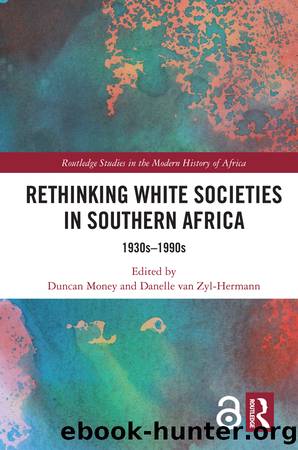Rethinking White Societies in Southern Africa by Duncan Money

Author:Duncan Money
Language: eng
Format: epub
Publisher: Taylor and Francis
Published: 2020-05-24T00:00:00+00:00
Conclusion: contradictions, misapprehensions and paradoxes
The state-connected media and propaganda apparatus of the Estado Novo represented the Portuguese settlers of the colonatos in a manner which differed significantly from representations in contemporary scientific studies, and from the dispassionate and crude perceptions held by the settlers themselves, as well as by their other white and African neighbours. The colonatos in âPortuguese Africaâ were based on multiple misconceptions and paradoxes. They were created in a period of accelerated economic development, anchored in technical and scientific knowledge, with which it was sought to relegitimise the empire against the advance of the anticolonial movement.93 Tiago Saraiva points out that âto fulfil the vision of a rural Portugalâ, those enterprises were inserted âin large state plans where technology plays a fundamental roleâ.94 In turn, science (agronomic, economic and social), though mobilised by political power â a priori or a posteriori â to give the colonatos a scientific basis, was often overlooked for opposing idealised or already ongoing measures.
The rigid and subservient discipline that was imposed upon the settlers did not hold them individually and socially responsible. Land ownership, the engine of attachment to land and permanent settlement, remained elusive. Moreover, the delivery of the plots of land was arbitrary, as these could be given and withdrawn by the state.95 As a programme of deproletarianisation,96 that is, of transforming the rural wage earners of the metropole into well-rooted landowners in Africa, the colonatos failed. Unable to raise the living conditions of the populations involved, they experienced high drop-out rates. The settlersâ children, when they became adults, typically sought jobs in the cities. The goal of securing national sovereignty and security in interior areas of Angola and Mozambique by populating them with white settlers in the colonatos was compromised.
As I have argued elsewhere:
settlers who were mobilised for the official colonatos occupied a sui generis place within the group of the so-called colonisers. Despite all the rhetoric, propaganda and idealisation of the rural settler, he was always a minority in the whole of the overseas migration and did not correspond to the average social profile of the Portuguese who fixated in Africa: with higher educational and professional qualifications, mostly urban and working in commerce, services and public administration.97
The settlers who established themselves in the cities, that is, the bulk of the white Portuguese in Angola and Mozambique, did not identify with the rural settlers. In fact, they perceived themselves as cosmopolitan, enterprising, and successful. The children of settlers, the so-called âsecond-rate Portugueseâ,98 heavily concentrated in urban centres, open to cultural interactions and international mass consumption,99 were still less likely to identify with villagers, hoe workers, regarded as caricatures of an archaic Portugal. That difference was perceived and emphasised by some of the colonised, who did not see the distinctive marks of racial and civilizational superiority on the rural settlers.
Download
This site does not store any files on its server. We only index and link to content provided by other sites. Please contact the content providers to delete copyright contents if any and email us, we'll remove relevant links or contents immediately.
Warrior Queens & Quiet Revolutionaries by Kate Mosse(350)
A Rome of One's Own by Emma Southon(307)
Executive Order No. 9066: The Terrible Injustice Of 1942 by Sollace Freeman(301)
Respectability and Reform by Tara M. McCarthy(296)
The Evidence of Things Not Seen by James Baldwin(295)
The Explorers by Amanda Bellows(269)
A Wider Type of Freedom: How Struggles for Racial Justice Liberate Everyone by Daniel Martinez HoSang(247)
Letters From London by Julian Barnes(220)
Rethinking White Societies in Southern Africa by Duncan Money(215)
The Grey Eagles of Chippewa Falls by John E. Kinville(214)
Liberty's Dawn: A People's History of the Industrial Revolution by Emma Griffin(212)
The Crosswinds of Freedom by James MacGregor Burns(211)
A Troublemaker May Surprise (The Troublemaker Series Book 2) by Genta Sebastian(197)
Evolution of Slavery Through the Ages: A Comprehensive World History of Slavery by PRESS VERITY(194)
A Teacher's Guide to Ladies of Liberty by Cokie Roberts Amy Jurskis(182)
The Slave Ship, Memory and the Origin of Modernity by Martyn Hudson(177)
Continental Strangers by Gemunden Gerd;(174)
Beware the Masher by Kerry Segrave(164)
Hunger Dark Pen by Dark Pen(159)
